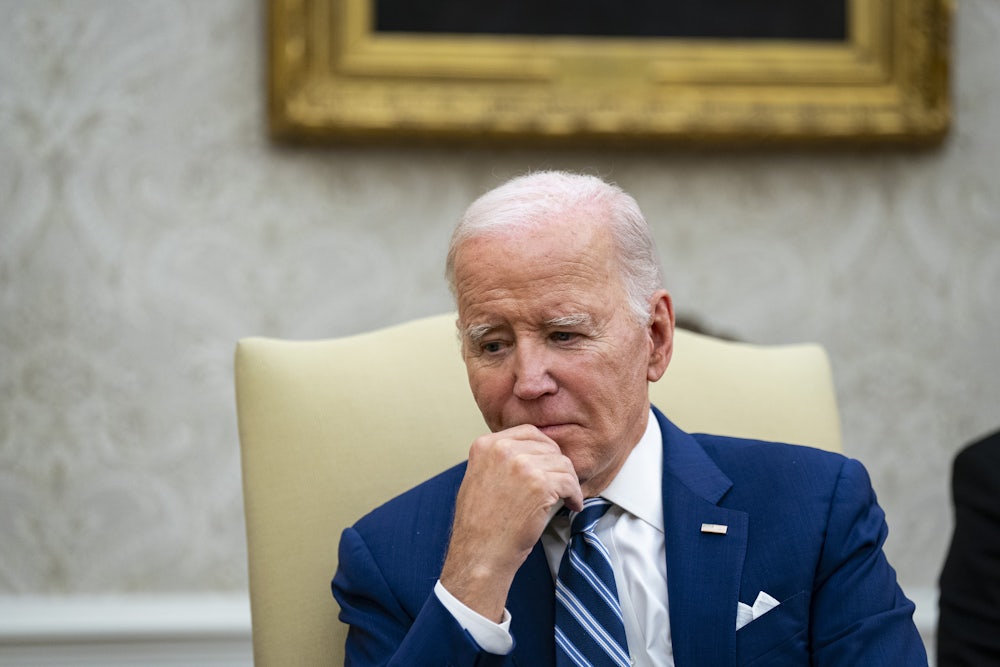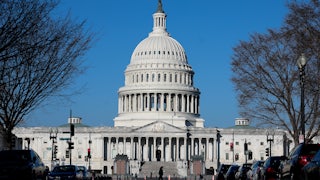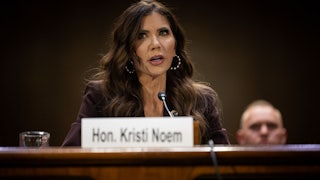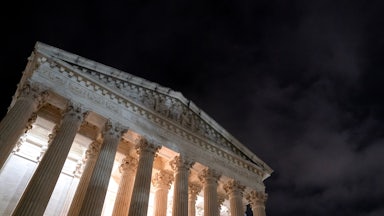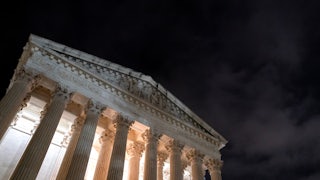When Joe Biden was deciding in late 2018 whether to run for president, he reached out to his network of would-be supporters with a pithy, pragmatic ask. “If you can persuade me there is somebody better who can win, I’m happy not to do it,” he said, according to The New York Times. It turned out there wasn’t somebody better to take on President Trump—or at least, Biden wasn’t persuaded that there was—and a few months later he officially threw his hat into the ring.
It wasn’t exactly a surprise. Biden, already a twice-failed presidential candidate, had been openly weighing another run for years. In a 2017 speech at Colgate University, he said he regretted “not being president” and that he could have beaten Trump. “I had a lot of data,” Biden said. “I was fairly confident that if I was the Democratic Party nominee, I had a better-than-even chance of being president.” And in January 2019, he said, bluntly, “I don’t see the candidate who can clearly do what has to be done to win.”
Within the next three months, though, the Democratic field ballooned with myriad compelling, experienced candidates, most of whom were far younger and more representative of the party’s diverse coalition. Did Biden, then 76 years old, really still believe he was the best hope to stop Trump? It seemed he did, based on a simple calculus. He had the blue-collar bona fides to win over working-class whites in the Midwest, high support among African American voters, thanks in part to his close relationship with the most popular Democratic president of the modern era, and a folksy charm to win over suburban soccer moms. And the polls agreed.
But Biden’s decision to jump into the race wasn’t just strategic; it was moral. As the candidate best positioned to beat Trump, he owed it to the American people to run. “We are in the battle for the soul of this nation,” he said in his April announcement video. “If we give Donald Trump eight years in the White House, he will forever and fundamentally alter the character of this nation—who we are—and I cannot stand by and watch that happen.”
It was a sound—and winning, it turned out—argument. But if you apply the logic of Biden’s 2020 campaign to today’s presidential race, the conclusion is decidedly different, albeit equally clear: He should not be running for reelection.
First, the idea that Biden is uniquely qualified to unify the factions in the Democratic Party, let alone the nation as a whole, no longer holds true. Black voters are as alienated from the Democrats as they have been in decades. Blue-collar voters are defecting en masse. Suburban voters have turned on him too. And after years of commanding the spotlight himself, Biden can no longer bask in the glow of the now-distant Obama years. Today, his approval ratings are on par with Trump’s and Jimmy Carter’s at this point in their presidencies. Even more troubling, they dip below those of George H.W. Bush, Gerald Ford, Richard Nixon, and Lydon Johnson. Things didn’t turn out well for any of them. Why would Biden be any different?
He’s not. Biden has lost all of his advantages in battleground states, trailing Trump in Nevada, Georgia, Arizona, Pennsylvania, and Michigan. A recent Times/Siena poll showed that among registered voters in those five states plus Wisconsin—all of which Biden carried in 2020—he trails Trump by four points (which is barely within the margin of error). His campaign argues that polls always look bad for incumbents at this stage and that it’s easy to overblow an outlier poll here and there. But the Times/Siena poll wasn’t an outlier. Polling data aggregators have consistently shown Trump beating Biden for over two months now.
Democrats looking for a calm, nuanced explanation for why these polls shouldn’t be troubling will have to look elsewhere than the president, who said on Thursday he simply doesn’t believe he’s trailing in battleground states. Even the Biden of 2018 wouldn’t buy that.
It’s true that a lot could change between now and next November. The Biden optimists often note that Trump could become a convicted felon, but it’s not at all clear whether that would actually hurt Trump in the election. Inflation has eased, but prices are expected to remain high—perhaps for good. Russia’s war in Ukraine is at a stalemate, and one can only guess how much worse the conflict in the Middle East will get.
As much as political commentators like to disdain them for it, Americans ultimately pick their presidents on a feeling. The candidate who wins is the one who best recognizes the national mood and taps into it. After years of Bill Clinton’s slipperiness, the idea of grabbing a beer with George W. Bush sounded a lot better than chilling with the sweater-vested Al Gore and kite-surfing John Kerry. Barack Obama made the electorate feel hopeful after years of wars and recession. And in the end, Donald Trump tapped into a powerful feeling of resentment.
In 2020, voters turned to Biden because he promised competence and normalcy after the chaos and negativity that Trump had wrought. There’s no doubt that Biden delivered on that front—and even passed some historic legislation—but ultimately many Americans are still racked by despair and pessimism. In 2024, just like they have in the past, Americans will pull the lever, wisely or not, for whichever candidate they feel will most likely shake us out of our current malaise just to get us someplace different, for better or for worse.
Seen through this lens, the answer to the question that baffles some pundits—why is Biden so unpopular?—seems fairly obvious. The antidote to a world enmeshed in wars, a leaden economy, and an environmental catastrophe is not a mumble-prone 80-year-old incumbent. There’s no tactful way to say it: We want to face the apocalypse with Bill Pullman’s President Whitmore, not Weekend at Bernie’s.
The country is once again facing more than a 1 percent chance of a second Trump term—indeed, perhaps a greater than 50 percent chance. At the top of the Democrats’ priorities should be nominating someone with an overwhelming chance to stop that from happening. That candidate is not Joe Biden.
To be sure, even if Biden were swayed by my modest proposal, dropping out of the race would cause a host of complications. The deadlines for candidates to file in several primaries have already passed. And the candidates most prepared to step into his place—Kamala Harris, Pete Buttigieg, maybe Dean Phillips—wouldn’t be a likelier bet to beat Trump. But were Biden to drop out, it would clear the way for more promising candidates to step in: Michigan Governor Gretchen Whitmer, Kentucky Governor Andy Beshear, Maryland Governor Wes Moore, New Jersey Senator Cory Booker, Illinois Governor J.B. Pritzker, California Governor Gavin Newsom, Pennsylvania Governor Josh Shapiro. And as the likelihood of a second Trump presidency came into view, Democratic voters, as in the run-up to the 2020 election, would eventually flock to the candidate they felt was most likely to take down Trump.
While the strategic arguments for Biden’s candidacy have all but collapsed, the pressing moral argument he made in 2018 remains as true now as ever. If Democrats lose the White House in 2024, they won’t be turning over 1600 Pennsylvania Avenue to a generic Republican or even a Trump mini me like Ron DeSantis. They will most likely be handing the keys back to Trump himself. And if the Biden of 2019 is to be believed, that will fundamentally alter the character of our nation. If only the Biden of today would listen.
